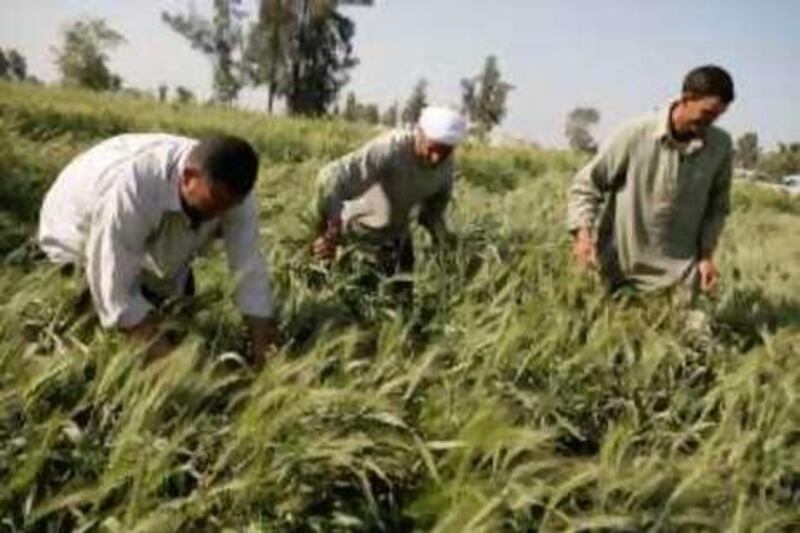More than two million Egyptians will lose their homes within the next 25 years and at least six million will have been made homeless by the end of this century as a result of rising sea levels caused by climate change, according to a UN report.
The State of the World's Cities Report 2008/9: Harmonious Cities, by the UN Human Settlements Programme (UN-Habitat), says a sea level rise of 50cm will lead to major coastal erosion, flooding and a rise in the water table, forcing two million people in Egypt's north coast and delta region to abandon their homes. It will also wipe out 214,000 jobs, cost US$35 billion (Dh128.5bn) in lost property and tourism income and result in the destruction of world-famous historic, cultural and archaeological sites.
According to studies by institutes in Egypt, the Mediterranean has been rising two centimetres each year for the past 10 years, meaning it will take at most 25 years before what the UN calls a "catastrophe" will unfold in northern Egypt. But many analysts believe the impact of rising sea levels will be even greater and felt sooner. "This is not just something that happens in 2050 or 2100, it is happening now, slowly but surely," said Salah Soliman, of Alexandria University's faculty of agriculture who holds regular workshops on combating climate change.
According to Prof Soliman, people in towns and villages across the north coast are already making plans to leave as the sea begins to encroach their land. Residential and commercial buildings farther inland are beginning to suffer foundation damage as the water table rises, leaving them vulnerable to collapse, especially in the case of earthquakes. "People know their houses will be demolished in a few years," Prof Soliman said.
As well as structural damage, farmers throughout the delta are losing crops to the rising water table as the salty seawater contaminates the groundwater and makes the soil infertile. This is particularly worrying given nearly half of Egypt's agriculture - including such crops as wheat, rice, corn and cotton - takes place in the delta region. While the delta accounts for only 2.5 per cent of Egypt's land mass, more than one-third of the population lives there. Alexandria on the north coast is Egypt's second biggest city with an estimated population of five million.
Moreover, projections of how many people will be affected by the rising sea levels use current population estimates, but Egypt's population of 80m is expected to double by 2050. The north coast is famous for its beautiful sandy beaches, but in past decades many have receded or, as is the case in Alexandria, disappeared. While certain measures have been taken to slow coastal erosion, such as constructing breakwaters along the beaches, scientists and researchers say it is too late to prevent or reverse the encroachment of the sea and the rise of the water table and planning now needs to focus on "adaptation" and damage limitation.
Boshra Salem, the chairwoman of Alexandria University's department of environmental sciences, said vulnerable areas should be identified and not built upon, but pointed out that construction work in such areas, particularly along the coastlines, continued unabated. "There are some touristic projects that are still ongoing in the shores and beaches, and these will definitely be affected," Prof Salem said.
Relocation plans for people in affected areas are urgently needed and future building in such areas must be avoided, said Prof Soliman, of the university's agriculture faculty. As for farmland, he said, one possibility was to develop crops that are resistant to high levels of salt to cope with the inevitable increase in salinity. Maged George, Egypt's environment minister, insists the government is working on a national strategy to adapt to climate change and rising sea levels.
Moreover, Mohamed el Shahawy, a climate scientist at the Egyptian Environmental Affairs Agency, told the Associated Press the government was obtaining a "vulnerability index and detecting the most vulnerable regions". Though he admitted Egypt would need international assistance. "Egypt is trying to protect its shores," Mr Shahawy said. "After this we will request that the world help. We have to protect ourselves. But it costs so much."
Another problem both experts and the government face is public apathy. Many Egyptians in the delta region live in dire poverty and are more concerned with putting food on the table. Sensationalist coverage of the rising sea levels in local media has not helped either, Prof Salem said, leading to public scepticism over how serious it really is. "Some people believe in it and some don't. This is because [there were] a lot of exaggerations in the newspapers and TV that were not built on sound scientific data? So people started to worry about other living problems."
jspollen@thenational.ae





